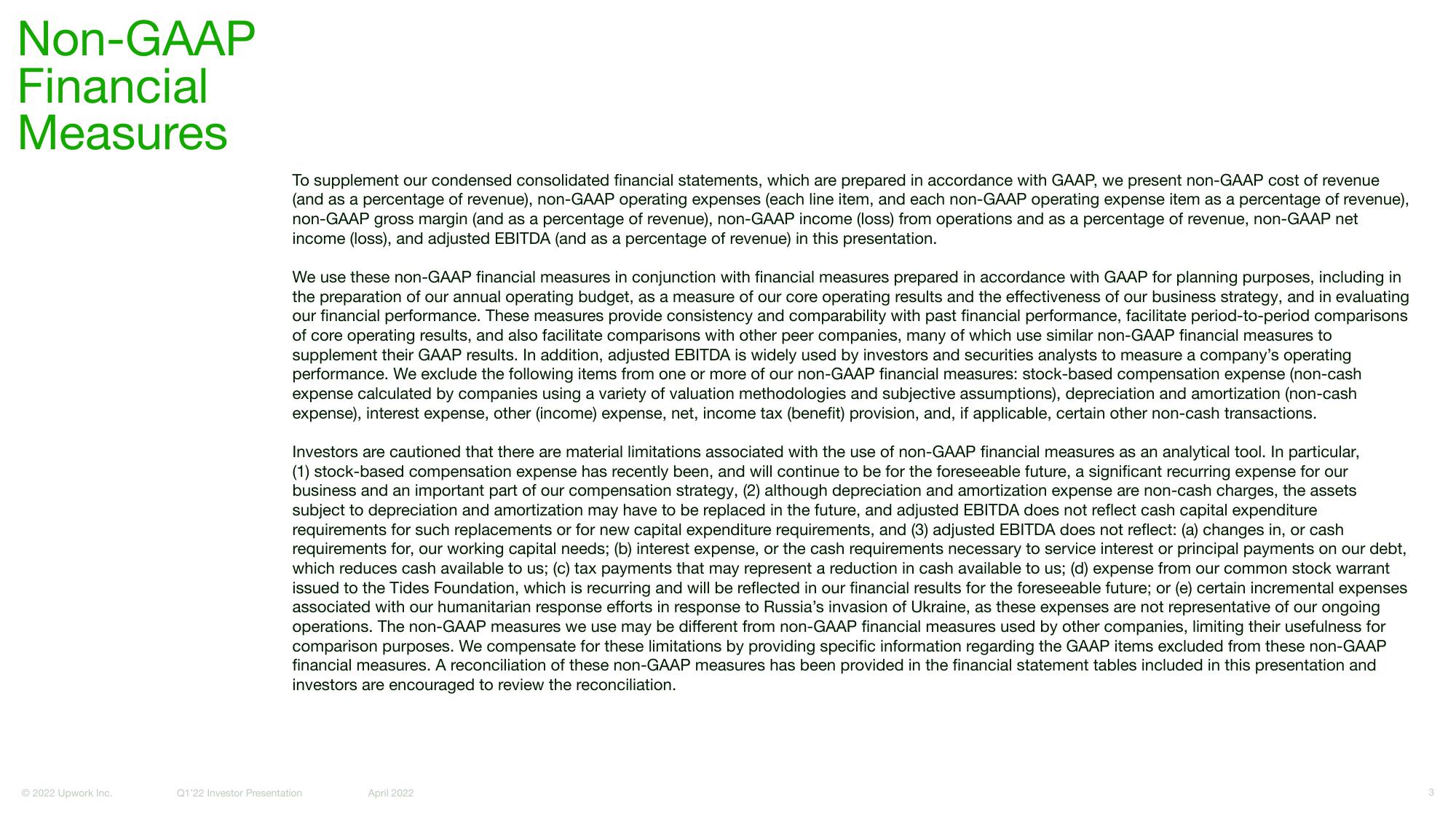Upwork Investor Presentation Deck
Non-GAAP
Financial
Measures
Ⓒ2022 Upwork Inc.
To supplement our condensed consolidated financial statements, which are prepared in accordance with GAAP, we present non-GAAP cost of revenue
(and as a percentage of revenue), non-GAAP operating expenses (each line item, and each non-GAAP operating expense item as a percentage of revenue),
non-GAAP gross margin (and as a percentage of revenue), non-GAAP income (loss) from operations and as a percentage of revenue, non-GAAP net
income (loss), and adjusted EBITDA (and as a percentage of revenue) in this presentation.
We use these non-GAAP financial measures in conjunction with financial measures prepared in accordance with GAAP for planning purposes, including in
the preparation of our annual operating budget, as a measure of our core operating results and the effectiveness of our business strategy, and in evaluating
our financial performance. These measures provide consistency and comparability with past financial performance, facilitate period-to-period comparisons
of core operating results, and also facilitate omparisons with other peer companies, many of which use similar non-GAAP financial measures to
supplement their GAAP results. In addition, adjusted EBITDA is widely used by investors and securities analysts to measure a company's operating
performance. We exclude the following items from one or more of our non-GAAP financial measures: stock-based compensation expense (non-cash
expense calculated by companies using a variety of valuation methodologies and subjective assumptions), depreciation and amortization (non-cash
expense), interest expense, other (income) expense, net, income tax (benefit) provision, and, if applicable, certain other non-cash transactions.
Investors are cautioned that there are material limitations associated with the use of non-GAAP financial measures as an analytical tool. In particular,
(1) stock-based compensation expense has recently been, and will continue to be for the foreseeable future, a significant recurring expense for our
business and an important part of our compensation strategy, (2) although depreciation and amortization expense are non-cash charges, the assets
subject to depreciation and amortization may have to be replaced in the future, and adjusted EBITDA does not reflect cash capital expenditure
requirements for such replacements or for new capital expenditure requirements, and (3) adjusted EBITDA does not reflect: (a) changes in, or cash
requirements for, our working capital needs; (b) interest expense, or the cash requirements necessary to service interest or principal payments on our debt,
which reduces cash available to us; (c) tax payments that may represent a reduction in cash available to us; (d) expense from our common stock warrant
issued to the Tides Foundation, which is recurring and will be reflected in our financial results for the foreseeable future; or (e) certain incremental expenses
associated with our humanitarian response efforts in response to Russia's invasion of Ukraine, as these expenses are not representative of our ongoing
operations. The non-GAAP measures we use may be different from non-GAAP financial measures used by other companies, limiting their usefulness for
comparison purposes. We compensate for these limitations by providing specific information regarding the GAAP items excluded from these non-GAAP
financial measures. A reconciliation of these non-GAAP measures has been provided in the financial statement tables included in this presentation and
investors are encouraged to review the reconciliation.
Q1'22 Investor Presentation
April 2022View entire presentation